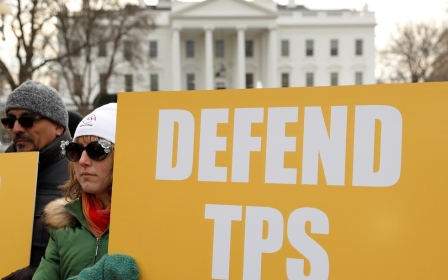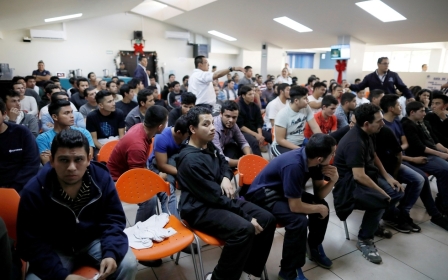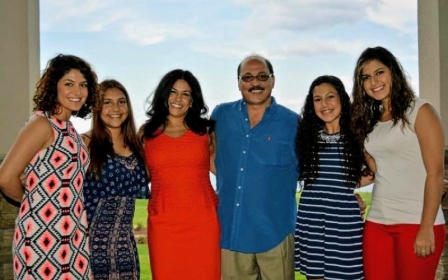What 'protected status' renewal means for Syrians living in US
A Syrian medical school graduate hoped to begin a residency training programme at an American hospital later this year, a step that would put him on a path to a lucrative career in a safe environment, far from his war-torn country.
Instead, he is now preparing himself to leave the United States and return to his shattered hometown in Syria, a place he has not even visited since the first embers of conflict ignited into street protests there nearly seven years ago.
The aspiring doctor shared his story with MEE but chose to remain anonymous out of fear for his safety.
The Department of Homeland Security (DHS) announcement on 31 January that it would extend its Temporary Protected Status (TPS) programme for Syria was met with relief by nearly 7,000 Syrians who would be allowed to continue living and working in the US. But there was a catch.
DHS extended TPS for those who previously held the status, but it did not re-designate the programme, meaning that it would not enroll any Syrians who arrived after the last registration period ended on 1 August 2016.
Now the medical graduate and an estimated 2,000 others who arrived in the US since then have to leave the US once their visas expire or risk deportation.
Contradictory ruling
While the decision to extend TPS was welcomed by immigrant advocates, the Trump administration’s move to block TPS for more recent arrivals was met with confusion and condemnation.
The International Rescue Committee called the decision “bad" and “irrational". And the American Civil Liberties Union said: “The Trump administration doubled down on its racist and anti-Muslim agenda.”
TPS is designed to allow foreigners whose countries have been made unsafe by war or natural disasters to stay in the US on a temporary basis. It is not a path to citizenship or permanent residency, nor are its holders considered refugees.
Critics of the TPS decision point to the apparent contradiction between the US government saying that Syria remains too dangerous for those here on TPS to return to, while simultaneously taking steps to force recent arrivals out of the country.
Syrians who have TPS will be allowed to stay in the US until at least 30 September of next year after re-enrolling in the programme. But immigration experts fear that the roll-back of the Syria TPS programme - combined with the Trump administration’s anti-immigration bent and its cessation of other TPS programmes - means its days are numbered.
“This is signalling that the administration does not want to continue this protection,” said Nadeen Aljijakli, a Syrian-American immigration attorney in Cleveland, Ohio.
“I think there’s definitely a risk that this programme will not be continued after the next 18 month period.”
Former DHS official Amanda Baran, an attorney who now serves as a consultant to the Immigrant Legal Resource Centre in Washington, agreed that TPS could still be in danger.
“I do worry about Syria. I worry about Yemen. I worry about countries that are on the Muslim ban list,” Baran said. “I worry that they’re trying to figure out ways to limit the ability of people from those countries to be here.”
Could the US really deport Syrians?
Although a number of Syrians are set to lose their legal status, deporting them may be a complicated logistic and legal process.
There is no relationship between the US and Syria’s government. There are no direct flights between the two countries. And amid the global refugee crisis, very few countries admit Syrian citizens without a visa.
I think it's a very scary place to be when at any moment maybe the wrong signal on your car or speeding a little could put you into the deportation machine.
- Amanda Baran, former DHS official
“If any Syrians ended up in our removal proceedings, it would be really difficult for the immigration enforcement agency to execute any eventual removal orders,” said Sarah Pierce, a policy analyst at Washington’s Migration Policy Institute.
“There are definitely countries out there that we can’t deport people to.”
But according to statistics from the Immigration and Customs Enforcement agency (ICE), 25 Syrian citizens have been deported from the US since 2014.
Speaking to Middle East Eye, an ICE spokesman said deportations in tricky situations like Syria’s are handled on a case-by-case basis and that deportees are generally sent to a third country that they are allowed to enter.
Despite these obstacles, there are still concerns that Syrians lacking legal status could be detained and ultimately deported.
ICE says its efforts are focused on criminals and national security threats. However, emboldened by the Trump administration’s promises to crack down on undocumented immigrants, the agency has increasingly been detaining people whose only crime is being in the country without legal status.
This week, the Washington Post reported that ICE made 37,734 “non-criminal” arrests in 2017, more than double the number it made in 2016. Foreigners without legal status have been detained for traffic violations, for showing up at court and even for calling the police to report crimes.
“I think it's a very scary place to be when at any moment maybe the wrong signal on your car or speeding a little could put you into the deportation machine,” said Baran, the former DHS official.
“The more that local jurisdictions cooperate with ICE to arrest people, the more likely there’s a chance that somebody who hasn’t committed a crime or isn’t a priority will come in contact with ICE. So they’re very much exposed. They’re exposed to deportation.”
If Syrians are somehow forced back to their country, many could be in grave danger said Aljijakli.
“It’s not just dangerous, it would be a death sentence for people who have any political involvement,” she said. “And we’re not talking about leaders in political movements: We’re talking about people who simply have voiced their disapproval of what the Syrian government is doing.”
Death of dreams
Ever since he began his studies, the medical school graduate dreamed of becoming a doctor in the US.
After graduating from medical school in Jordan, the 26-year-old came to the US last year - after the TPS cutoff date. He entered on a work visa to do clinical rotations at a hospital as he prepared to apply for a residency programme. But now that he is not eligible for TPS, his plans are changing.
I was scared. I was confused. I did not know what to do.
- Syrian medical school graduate
His visa is set to expire in April. He could try to extend it, but is afraid that if it is denied, it will hurt his chances of getting any future visas to the US. And he is sure that staying illegally would hurt him even more.
“I was scared. I was confused. I did not know what to do,” he told MEE. “Then I came to the realisation that I might have to go back to Syria. I’ve been trying to prepare myself psychologically.”
For now, he is planning to return to Homs, a city considered a birthplace of Syria’s uprisings in 2011 that has since become synonymous with destruction.
He worries about the violence that he has so far escaped. He has not yet told his parents of his predicament, not wanting to add to their daily stresses of living through the war. He also does not know how the Syrian government will receive him.
“In Syria, you cannot be sure if you have problems with the government or if you don’t. Personally, I’m not courageous enough to speak politically, I’ve been silent over the course of the things happening in my country. But you cannot be sure if you are safe, especially if you are from the city of Homs,” he said.
Another Homs native who came to the US last year to pursue a PhD is also left ineligible for TPS. The 30-year-old graduate student who spoke to MEE on condition of anonymity said she deferred her PhD programme to work on her English and hoped that gaining protected status would allow her to legally work and fund her education.
She believes that she could extend her education visa, which expires within weeks, but she fears she only has enough money to last for a few months. She does not know what she is going to do.
“Going back to Syria is like a death sentence for my dreams,” she told MEE.
New MEE newsletter: Jerusalem Dispatch
Sign up to get the latest insights and analysis on Israel-Palestine, alongside Turkey Unpacked and other MEE newsletters
Middle East Eye delivers independent and unrivalled coverage and analysis of the Middle East, North Africa and beyond. To learn more about republishing this content and the associated fees, please fill out this form. More about MEE can be found here.




